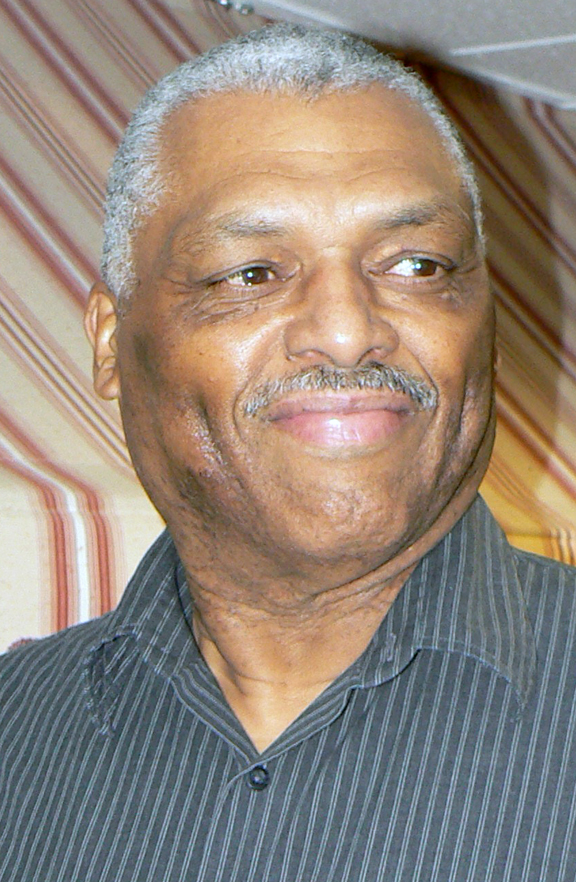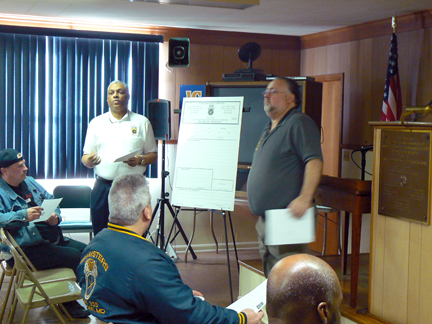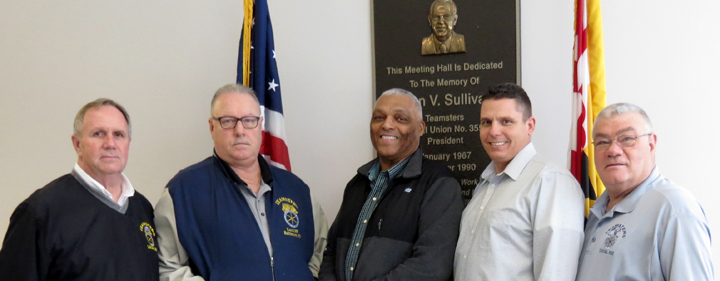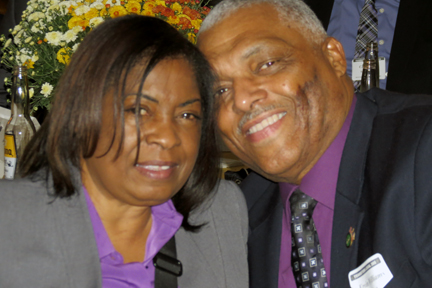|
 On New Year’s Eve last year, Ervin Williams, our Local’s vice president since 1999, retired to his home in Chesapeake, Virginia. True to his laid-back character and relaxed demeanor, Erv departed quietly without fanfare; few knew of his plans to return to his home state and his family to begin the next chapter in his book of life. On New Year’s Eve last year, Ervin Williams, our Local’s vice president since 1999, retired to his home in Chesapeake, Virginia. True to his laid-back character and relaxed demeanor, Erv departed quietly without fanfare; few knew of his plans to return to his home state and his family to begin the next chapter in his book of life.
Erv, one of six children in a merged family, was born and raised in Virginia Beach, Va. He went to Norfolk State College where he trained as an automotive mechanic and subsequently became an industrial education instructor. When one of his students told him UPS in Norfolk was looking for a mechanic, he applied. When notified in June 1978 that there were no longer openings for that particular job, he accepted a position as a package driver.
Erv joined Teamsters Local 822 in Norfolk, served as a shop steward and six years later became a Local Union business agent. From 1985 to 1991 he served in all the offices of the executive board, including secretary-treasurer in 1989 and principal officer in 1991. He served as a member of the Regional and National Car Haul Negotiating Committees, and Regional Master Freight Negotiating Committee. Erv was also a member of the Atlantic Area Parcel Grievance Committee (UPS) which is where he met President Denis Taylor. When he lost his re-election bid in 1994, Erv was invited in October 1995 to join the staff of Local 355 in Baltimore. He was elected vice president in 1999.
Erv served as legislative representative for Teamsters Joint Council 62, of which Local 355 is a member, from 1997-1999. He was a trustee of the Eastern Shore Teamsters Health & Welfare Fund from 2003 to 2007, and a Teamsters Local 355 Health and Welfare Fund trustee from 2007 until his retirement. In addition, he was the president of the Local 355 Maryland Federal Credit Union.
With assurances that he’ll “be around” if needed, Erv graciously agreed to talk with us and share a bit about himself and his thoughts about his leadership experience. In February, Erv spoke with us from his home in Virginia.

Local 355 Union News: You’re an auto-mechanic who became a UPS driver, but gave up that good-paying job and time with your family to take what is often considered to be the thankless job as a labor leader. You then spent the rest of your career advocating for and taking care of others. What is it that drives you?
Erv Williams: I think it was my personality and the fact that I believe one person can make a difference. What I had seen some other people in leadership do I didn’t think was right, and I wanted to take the helm and correct the wrongs to our members. I had observed the selfishness of people in leadership who preceded me. This job is an unselfish job, one that helps give others the voice they deserve. I also think that it’s my religious belief of doing unto others as you would have them do unto you. Love your neighbor as yourself.
355: So that is the all-important principle that underlies all you do?
EW: Yes.
355: Let’s take a look back on your journey with Local 822 and Local 355. Share with us the highlights of your career as a Teamster leader; your most memorable experience and, conversely, what you recall as having been the most difficult.
EW: I think that whatever we do as people, we still have to be able to look at ourselves in the mirror. That decides the person we are. The ability to be able to see the good in people, see the best in people, is part of what we do as leaders.
So that translates into probably the highest level we can reach as members and as elected officers: We ran unopposed in our last local union election. To be the vice president in that process gave me a humbling feeling; I can't help but feel honored by that. You're working hard at the job on a day-to-day basis, but do those efforts translate into people voting for you when it comes time for you to stand for a re-election? The answer is yes.
 I know the Taylor-White team is doing an excellent job of making our local union one of the best in the country. We do some programs that not many local unions do. In addition to that, to be a part of an organization like the International Brotherhood of Teamsters where you have 1.4 million members, and our people have some of the best contracts in the country. It’s a humbling process, but it also is a wonderful process because you can see people grow, and you can see the advantages gained. You see those who were at the lower end of the totem pole reach the upper echelon of their worklife, as far as pay, benefits, and retirements. All that makes me proud. As the Bible says, the person to whom much is given, much is expected. I’ve always believed that I had an obligation to do my part in that while representing the members. We try to do the best we can for them. I can look at myself in the mirror and say, yes, I am very proud of what we’ve accomplished. I know the Taylor-White team is doing an excellent job of making our local union one of the best in the country. We do some programs that not many local unions do. In addition to that, to be a part of an organization like the International Brotherhood of Teamsters where you have 1.4 million members, and our people have some of the best contracts in the country. It’s a humbling process, but it also is a wonderful process because you can see people grow, and you can see the advantages gained. You see those who were at the lower end of the totem pole reach the upper echelon of their worklife, as far as pay, benefits, and retirements. All that makes me proud. As the Bible says, the person to whom much is given, much is expected. I’ve always believed that I had an obligation to do my part in that while representing the members. We try to do the best we can for them. I can look at myself in the mirror and say, yes, I am very proud of what we’ve accomplished.
At the other end of that, the most difficult part of representation is to have some of our great companies go out of business as a result of greed — or whatever has been their process. And you know that those too, are humbling events because after all, we’re in a partnership making strides together. Alone as an individual advancing your cause is very hard to do. The job market is not as robust as in times past, and our international union — and unions in general — have lost vast numbers of members. Still, we hold as much power as we once did because we are continually organizing new members. You are always concerned about the relevancy of the organization of which you are a part.
335: Unions across the country have been under attack in recent years, forcing us to deal with difficult circumstances. So to that point, what message would you offer Local 355’s nearly six thousand members regarding their role as a member of our Brotherhood of Teamsters?
EW: They need to do as we have done in the past, and that is, be involved and committed to the cause of making things better for themselves and others. And remember, even as an individual, we are the union. The members are the union. We can only go as far as the membership carries us. We are chained together. And so once we are one, are you a weak link or are you a strong link? We don’t want the chain to be broken and it’s only through our strength and unity that we can remain one. I think the message going forward is to communicate the importance of involvement to our younger members using all the avenues available to us.
Our strength is in our people. There is power in the unity of our organization. It’s not power in the individuals; rather it’s the committed unity of us working together in shared sacrifice to create that strength. I think we need to get back to that instead of being that selfish individual who says, oh, you never resolved my problem, when there may be a bigger issue than your problem. Maybe you didn’t get that greater benefit — like the extra holiday you wanted — during negotiations. Well, you didn’t get the holiday, but we got an extra week vacation, a benefit to everybody. That’s the type of shared sacrifice that our members don’t seem to go for as much because they're not used to looking at it from our standpoint, which is to improve every agreement. Most of our agreements have been improved, and people's financial lives have improved, including the funding for their Health & Welfare and retirement plans.
355: You believe the work you and other trustees did with the Local's health and welfare fund was crucial. Why?
EW: It started in 1959 when we had a medical plan and a pension plan. Most of those plans started off with contributions of two to three cents an hour. Over the years and up until about eight to ten years ago, escalating medical costs were amounting to the same as people’s salary. As a local union, we had Local 876 and Local 355 in our area, so they combined the two plans in 2007, and we became one plan. We have been able to improve it over the last few years, even up until this year, and reduce benefits costs to our members. We were able to put additional monies away for the plan to be able to operate for an extended period.
The health plan has increased from a few million dollars to over $52 million. I’m proud of the fact that we can see that amount of improvement and the security of that being there for the members to take care of their medical issues. Personally, I never had to use it until a few years back when my wife became very sick and in the hospital for 44 days. We were looking at probably close to $2 million for her care and the like. We’ve been able to pay off what we needed to pay off, but the fund was a godsend. You never think that you have to use it, and it was there.
The plan couldn't have done as well without the cooperation between the union and the employers. The employer trustees have been excellent about working together with us to do what we needed to do to get that plan where it is and keep the costs down for our members and our companies as well.
355: When we spoke earlier about what else you're passionate about besides the Teamsters Union, you talked about your church, the Chesapeake Christian Center, and your family. Tell us a little about your family.
EW: I have three children and six grandchildren. We’ve had a couple of foster kids, too. My wife loves kids, and I love my wife so therefore – we love kids.
355: So what is next for you?
 EW: The last few years my wife Ora's medical issues had pretty much stopped my kids’ lives because I was working and they were here trying to help take care of her and also do what they needed to do. I felt like it was time for them to get on with their own lives. It is my responsibility to take care of my wife so the first thing for me now, is to spend time with my family and quality time with Ora. I also want to get more involved in the community and my church. EW: The last few years my wife Ora's medical issues had pretty much stopped my kids’ lives because I was working and they were here trying to help take care of her and also do what they needed to do. I felt like it was time for them to get on with their own lives. It is my responsibility to take care of my wife so the first thing for me now, is to spend time with my family and quality time with Ora. I also want to get more involved in the community and my church.
I’ve always been a musician, and I used to play bass guitar for the church. They have a young man doing that now. I haven’t yet stepped back in that aspect, but I want to be there to help out.
I don’t have big aspirations or goals. Right now I’m floating; I’ve only just retired. I know that there is something out there for me. God hasn't ignored me thus far. I know He has something for me to do, something that will allow me to continue to do what I have done over the years — helping others. I'll do whatever I need to do.
355: Perhaps younger or newer members who didn’t have a chance to know you will be inspired by your message, take a closer look at a leadership role for themselves and think, maybe I could learn to do what Erv Williams did.
EW: I believe with the membership and the leaders that we have in our Local, I can see some great things coming from our young guys, such as Mark, John, Eric and others. They have worked hard to get where they are and they’re doing good work. They are fair, and connected to the members. They have empathy for the members; they care about them and the local union. That is paramount.
I see a strong future for our organization with current and future leaders. I believe the members are in good hands.
|